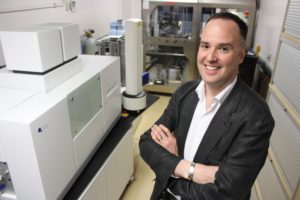2020 Postcard from Palm Springs
Highlights from the 2020 CHDI HD Therapeutics Conference are now here! This year’s Postcard covers HTT-lowering therapeutics, including an
Read more
 Few people know the huntingtin protein better than biochemist Ray Truant. He began analyzing the structure of this hugely complex molecule when he joined McMaster University in 1999. In the two decades that followed, his lab has achieved breakthrough after breakthrough — most recently, showing that normal huntingtin plays a key role in DNA repair.
Few people know the huntingtin protein better than biochemist Ray Truant. He began analyzing the structure of this hugely complex molecule when he joined McMaster University in 1999. In the two decades that followed, his lab has achieved breakthrough after breakthrough — most recently, showing that normal huntingtin plays a key role in DNA repair.
Although his work focusses on fundamental science, Dr. Truant never loses sight of the people it will help. “My end goal in all of this — in my career — is to get something that’s going to make a difference in the clinic,” he explains.
That’s why he got involved with the Huntington Society of Canada (HSC). In 2007, when Dr. Harry Robertson decided to retire as chair of HSC’s Research Council, Dr. Truant stepped up to take his place. He’s been serving on the Council — and as an officer of HSC’s Board of Directors — ever since.
Volunteering his time just makes sense, he says. In his own lab, he focuses on one part of the HD puzzle. Through HSC, he’s helping support research at every stage of the pipeline.
The most obvious way is through grants. HSC funds “high risk, high reward” projects that give investigators the results they need to get longer-term funding from national agencies like CIHR and NSERC and that help young scientists enter the HD field.
He also sees big payoffs from the clinical trial readiness roundtables we launched in 2013 and the clinical fellowships we currently offer young neurologists. Today, Canada is a leader in clinical research, with trials and observational studies running at seven sites across the country. Meanwhile, HSC’s work for genetic fairness laws means Canadians can now undergo the testing required to participate in clinical trials without fear of discrimination.
But according to Dr. Truant, the smartest thing HSC has done since he joined the Board is invest in youth. Through YPAHD, the international HDYO initiative and our world-leading mentorship program, the Society has provided crucial support to young people and created an influx of fresh energy into the organization. “It was wildly more successful than we thought it would be,” says Dr. Truant. In fact, some of those youth are now working in his lab, inspired to choose a career in HD research.
With effective treatments now a real possibility, that research has never been looked more promising. What currently excites Dr. Truant are the genome-wide association studies showing that several genes can modify the age of HD onset. This explains why two people can have the same CAG count, but one person begins showing symptoms 30 years later than the other. Now we just need to figure out how to control those genes. “Nature is telling us it’s possible,” he explains. “It’s a fixable problem.”
Pharmaceutical companies see that potential. Today, they’re investing in HD research because they believe successful treatments will open the door to treatments for Alzheimer’s, Parkinson’s and other neurodegenerative diseases.
But how we work is just as ground-breaking as the results we get. Scientists in other fields can learn a lot from the collaborative nature of HD research, says Dr. Truant. When he switched from the brutally competitive world of HIV research, investigators he didn’t know readily shared material and insights, and at his first conference, geneticist Dr. Nancy Wexler welcomed him with a big hug.
Today, he figures half his friends come from the HD community, making his work even more meaningful. “I don’t have any genetic motivation from my family’s perspective,” he says. “But I definitely have an emotional involvement. This is 20 years of my life’s work so far.”
Two decades in, that involvement hasn’t wavered. Read Dr. Truant’s paper in this issue of Horizon about research in HD and the application to other neurodegenerative diseases.
Download the 2021 Spring Horizon newsletter – click here.